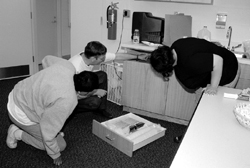By Katherine Edgren
School of Public Health

Local agencies and organizations in partnership with the University are working to address the problem of asthma in children in the east and southwest sides of Detroit. The project involves more than 300 families in Detroit who have children ages 7–11 with asthma.
Through the five-year Community Action Against Asthma (CAAA) project, community environmental specialists are meeting with families to develop plans to reduce household asthma triggers. Regular home visits over a two-year period are planned as well as interventions at the neighborhood level in attempts to reduce problems in the neighborhood that make asthma worse for children. The group also is studying exposure to air pollutants to determine the effects pollutants may have on asthma symptoms.
The families were located through a screening questionnaire, which was distributed through the mail and the schools. “The families are eager to work with us, both to help their children and to help their community,” reports Jean Patton, one of the community environmental specialists.
As a part of this communitywide effort to reduce asthma symptoms in children, brand new vacuum cleaners are being delivered to 150 families in the first wave of the project. The second group will be receiving them next spring. “Vacuuming with the right kind of filters can help rid the house of things that can ‘trigger’ asthma symptoms, such as dust mites, or cat dander,” says Randy Brown, a pediatric pulmonologist working with the group also is a board member of the Detroit Asthma Coalition and the American Lung Association.
Rose Smith, the mother of one of the children in the project says, “I like the project very much. It helped me to learn more about asthma and how to control it. It’s helped a great deal.”
“I see the bridging of partnership between the university and community-based agencies improving the quality of life for our families,” says CAAA Steering Committee member Erminia Ramirez, who is assistant director of Community Health and Social Services (CHASS).
“This is a great project,” says Alex Allen, director of the Butzel Family Center, “because participants benefit from not only the asthma related information and feedback, but the community environmental specialists try to address other problems that may plague the family, like the lack of health insurance, employment or housing.”
CAAA is a part of the newly established Michigan Center for the Environment and Children’s Health, and is funded by grants from the Environmental Protection Agency and the National Institute of Environmental Health Sciences.
In addition to the Butzel Center and CHASS, the community partners include Friends of Parkside, Warren/Conner Development Coalition, Latino Family Services, United Community Housing Coalition, Detroiters Working for Environmental Justice, Kettering Butzel Health Initiative, the Detroit Health Department and Henry Ford Health Systems. They are working with faculty, staff, and students from the School of Public Health and Medical School to design and direct project activities.

